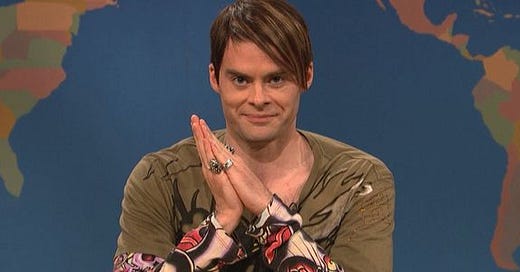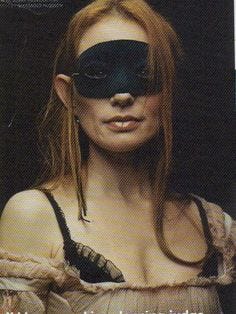We all wear masks in our lives. I don’t know a single person who is fully themselves 24/7, whatever a “self” is. We wear so many hats in our modern life - parent, friend, confidante, spouse, employee, sibling - and the idea of authenticity in our increasingly meta world feels patently ridiculous. What is an authentic “self”? Is it the person we are alone in the dark when no one else is watching? Or do the people around us create us? Either way, we all have these versions of ourselves that we bring out based on the situation.
The ADHD masks, however, are a little different. When you know something is wrong with you, but you can’t put your finger on it, you learn how to hide it. When I was younger, I talked too much, and I said some weird shit sometimes, and I was punished for it. Harshly. I was the target of bullies in 6th grade, and that experience showed me that I simply could not continue on as I was. I was too much. I’ve always been “too much”. I have always been aware that I just rub some people the wrong way, and while it sucks, I can only conceal myself so much. I’ve tried to own it. Tori Amos has this amazing quote that I have carried with me since the day I first read it (this is where I mention I am a Tori Amos fan, but you probably already knew that):
“I know I'm an acquired taste - I'm anchovies. And not everybody wants those hairy little things.”
Since being diagnosed in April, the ways I have learned to mask my symptoms have become clearer to me. I know when I am doing it, and I know why I am doing it. I was so desperate for people to like me, and most of all, to come across as a person who Has Their Shit Together. Any time that mask would slip - getting too drunk, saying something stupid, making a dumb mistake - I would fall into a black hole of shame. My mother was emotionally abusive, and she often would tell me that I had a “dark side”, and that if anyone really got to know me they wouldn’t like me very much. Combined with the fact that I knew something was “off” about me that I could not explain, I carried that idea with me for far too long. With this diagnosis, I have been able to begin to disabuse myself of the notion that I am secretly a broken person, and that if anyone saw my flaws they would run for the hills. It is taking a lot of work. A lot more work than I thought.
When my medication is working, I am myself at my best. The functional, fun, buoyant person who gets along with just about anyone. The writer who is able to put her feelings and ideas into words that go together. The gal who fully has her shit together and knows where her keys AND her phone are. When the meds wear off, though, it can be some Flowers for Algernon shit. Suddenly, the brain stops working the way it was. I get jumbled and confused and scattered, and my working memory and executive function wave bye bye. The good news is that I can fully tell when this is happening. The hard part is that I have to acknowledge it, and get better at asking for what I need.
This past weekend, I went on an insane but awesome trip to Seattle to see the last show of Tori Amos’ tour. I was surrounded by people I have known for 20 years or more, and I also saw my younger brother (who also has ADHD). I was renting a house with seven people, most of whom are queer (more on that later in terms of my own self-identification), and most of whom are some flavor of neurodivergent. This house had everything: ADHD, autism, anxiety, MTV’S DAN CORTESE.
Joking aside, it was truly amazing to be around a group of people who know my history and that I don’t have to pretend around. When my Flowers for Algernon moments happened - putting a bizarre and completely wrong address into Uber, for example, at the end of a batshit insane night that would require its own blog to explain - I still felt the shame creep up behind me like a handsy dude at a bar. I have to shut it down in the same way I’d shut that creeper down - aggressively and immediately. Even though I did manage to beat back the shame, it was only after apologizing to the folks in my Uber approximately 47 times. My first instinct is always to ameliorate the shame with apology. I feel like I’ve done more apologizing for minor things than I ever needed to, but it is going to take a long time for me to actually stop. It’s going to take work and practice to let go of this overdeveloped sense of responsibility. It’s not my fault. I have a neurological processing disorder. I have had it since I was a child. My brain works differently than a neurotypical brain. When I didn’t have an explanation for it, though, sorry was all I had. Sorry I am like this. Sorry I messed up. Sorry I lost the thing. Sorry I didn’t do the thing right. Sorry I wasn’t able to keep the mask on. Drowning in a sea of sorry, tossed around in waves of shame, until I was delivered sputtering on the shore.
Dropping my masks around my nearest and dearest is requiring radical vulnerability on my part. I am not good at being vulnerable. I am fine with honesty. I am very open about my struggles and my life. I am giving of myself and my experiences, especially when I think it may help others. I don’t pretend like my life is perfect, or like I am perfect. But vulnerability is not the same animal as honesty. Being yourself at moments you feel weak is really, really hard. Asking for what you actually need is really, really hard. I’ve always overaccommodated the people around me while not paying enough attention to my own needs, triggers, and general physical state. I am learning to say things like “No, I actually need to eat right now” and “I am not having any more wine today” and “I’d rather we not do that thing”. The medication has helped me actually be able to identify when I am hungry, tired, sick, or upset. Before the diagnosis, it was a giant mysterious jumble in my head, and it was so overwhelming to figure out what I actually needed in the moment that I would just shut it out and disavow it. This disavowal never ended well for me. This is when I’d wind up having an anxiety attack, overindulging in food/alcohol/weed, or blowing up in anger - sometimes a combination of the three. I refuse to let myself get into that position anymore. I refuse to add more suffering.
I had a horrendous travel day leaving Seattle, which was a situation that would usually have my anxiety and ADHD symptoms at an 11. A delayed flight, crowds, a lack of solid sleep…all a perfect cocktail for me to be chewing xanax and sobbing in an airport bathroom. Instead, I was able to take care of myself. I kept myself calm and steady, and made a Plan B in case I got stuck at SeaTac overnight. I calmly scoped nearby hotels and kept my eye out for early morning flights if I had to rebook. I talked with friends. I listened to music and podcasts. I made sure I ate a full meal and I had a couple of drinks but did not overdo it. I got back to my apartment at 2 am on Monday, bleary eyed but still functional, and made a slice of pizza and passed out in my own bed with my cats. There were no more masks to wear. It was just me - all the versions of me - tired and happy to be home with my husband. I wasn’t in the world’s best shape the next day, but hey, he did order the anchovies on purpose.






Whew thank you for this post. I spent the weekend with my college roommate, her husband, my sister and our 5 kids age 6 and under a couple weeks ago. It was chaos but having so many ND adults who have such a history together and were also able to jump in when the ND kids were having their big feelings was so amazing, I felt so supported! When I was 16 I wrote a poem in English called Beauty Queen Smile and I remember my teacher writing to me a comment about existentialism and a piece called We Wear the Mask. Feeling like too much is the hardest piece of ADHD for me and it is a very lonely feeling as a kid. My parents weren’t abusive in any way but I internalized my feelings of failure any time I couldn’t “get my life together” and I don’t feel like I had the help I needed learning emotional regulation skills until we were dealing with my oldest kid’s meltdowns when I was about 30.
Wow! First of all, you're a awesome writer. The story painted a complete picture of what it felt like to be in your shoes; anxious, overwhelmed and misunderstand (by yourself and others). I felt emotional anxiety rising in me as I read your story. Great job.
Secondly, I'm pleased to hear your progress! I look forward to reading more of your work.